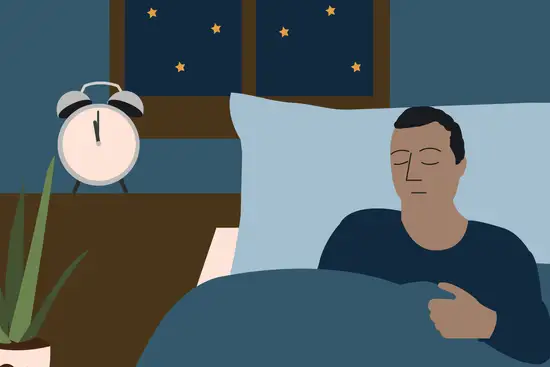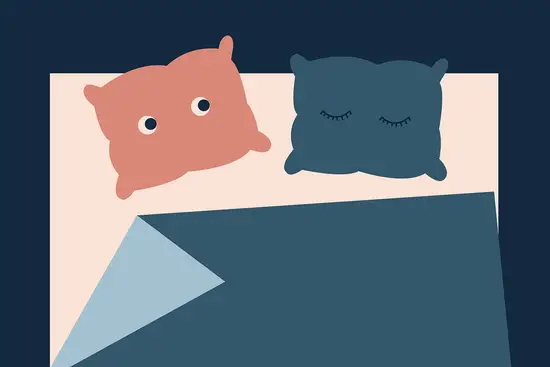Melatonin — key points
Interest in melatonin as a ‘natural’ sleep aid seems to be on the increase, even though this hormone isn’t actually available on the high street in the UK.
In this article, we’re going to cover the following points:
- what does melatonin do?
- melatonin as a sleep aid
- side effects of melatonin
- how to naturally look after your melatonin levels.
Does melatonin work as a sleep aid?
Melatonin is extremely popular as a sleep aid in the USA, melatonin containing products are sold over the counter in Canada but yet it remains a prescription-only drug in the UK, Europe, Australia and many other countries. So why do different places have such different rules about how melatonin is used?
It seems strange that while one country sees no problem with people taking melatonin as and when they wish, others feel that it should only be taken with medical supervision, and even then, only for short-term usage.
In this article, we’re going to explore what melatonin is, its functions in the body and what we know about its use, effectiveness and short-comings as a sleep aid. We’ll get started by dipping into the science of melatonin.
What is melatonin?
At its most basic, melatonin is a molecule that’s thought to exist in all living organisms. It’s in everything from plants and animals to yeast, fungi and bacteria.1
While you might have heard of it as a supplement touted to aid sleep, melatonin’s actually a really important hormone that your body naturally produces. It’s mostly made in a part of the brain called the pineal gland and is released into the body in response to darkness falling.
While it seems like melatonin production is triggered by darkness, light levels also play a role. When light enters your eye in the morning, the brakes are essentially put on melatonin production. It’s as the light levels decrease that the brake is slowly lifted and melatonin production increases again.
As light levels decrease, melatonin levels rise naturally about 1-3 hours before we go to sleep. The body releases melatonin all throughout the hours of darkness, with levels peaking in the middle of the night, around 2-4am.2 It then begins to steadily drop until, around dawn, levels are at their lowest and remain low throughout the day.
Because of its night-time production, melatonin is often called the ‘hormone of darkness’ and it’s been given the name ‘vampire hormone’ because it comes out at night and is stopped in its tracks by sunlight. If we’re being scientific, we can say it’s regulated by the light/dark cycle.
But it’s not just regulated by light, melatonin levels also follow seasonal variations. The body produces melatonin for a longer length of time during the darker winter months than during the shorter, lighter summer months.3
And thirdly, levels of melatonin also differ with age.4 Newborn babies produce very little melatonin, levels then rise in infancy and peak in early childhood. Melatonin production declines gradually throughout our lives until, in old age, the hormone can be almost undetectable in the body.
So to summarise
Melatonin is a key hormone in our sleep/wake cycle whose levels change depending on light levels, the season and our age. We’ll talk a little more now on what we know about the roles of melatonin in your body.
Are you concerned your melatonin levels might be low?
Melatonin supplements might seem like a simple way to get to sleep, but a quick fix can’t get to the source of your sleep problem. Fix your sleep problem from its root cause with our clinically validated and scientifically proven system. Let us help you put an end to your sleepless nights.
What does melatonin do?
We often think of melatonin as the ‘sleep hormone’, but it doesn’t actually put you to sleep. It’s involved in regulating your body clock and is the signal that sets off a cascade of processes that lead us to fall asleep and stay asleep.
Think of melatonin as the factory whistle at the end of the day, signalling that all the machines need to be stopped and then, when everyone has left, the lights are turned off.
The whistle doesn’t shut down the factory itself. It’s just the signal, in the same way that melatonin doesn’t make you fall asleep, it just tells the body to get ready for sleep.
And while melatonin is most famous for its role in sleep, it’s known to be involved in other processes in the body. We’ve discussed how it acts as a sleep signal, but it also works as a signal to synchronise other processes, including your core body temperature and blood pressure.
Body temperature and blood pressure follow a rhythm, much like sleep does. They rise during the daytime and fall lower at night. These daily (or circadian) rhythms are just two that are synchronised by melatonin levels.
Melatonin has also been shown to play a role in regulating our immune system.5It can stimulate the body to produce immune cells and it can play a role in reducing inflammation in the body.
It’s also an antioxidant, meaning it can protect cells and their DNA from damage. You may have heard of the term ‘free radical’ before; it’s often used by advertisers to promote anti-ageing products or sun creams.
Put simply, free radicals are molecules that can cause damage inside the body and melatonin likely evolved in cells as a way to protect them against these damaging particles.1
Because of these protective effects, melatonin is being investigated as a potential treatment in a range of diseases, especially those involving damage in the brain such as stroke, Alzheimer disease, Parkinson disease, Huntington’s disease.6
Melatonin is also known to play a role in cancer prevention. Damage to DNA is known to cause cancer, so in its role as an antioxidant, melatonin protects our cells from damage and as such, it helps to reduce risk of cancer developing.
Secondly, melatonin has been shown to slow the growth of cancer cells, reduce spread and cause cancer cells to die.7 Its potential as a drug to help in cancer treatment is currently being investigated in several cancer types.8
There are several other functions of melatonin that we’ve not discussed and doubtless more remain to be identified. So it’s clear that melatonin is a highly versatile and extremely important molecule in our bodies whose role extends way beyond just making us feel sleepy!

Clinical uses of melatonin
In the UK, melatonin is licensed for the short-term treatment for insomnia for patients over the age of 55. It’s only available on prescription from a GP in the UK and can’t be purchased as a supplement or sleep aid in high street shops.
According to guidelines from the National Institute for Health and Care Excellence (NICE), melatonin is given at a starting dose of 2mg to be taken once per day. It’s recommended to take it after food, an hour or two before bedtime.9
It’s also recommended to take it for three weeks to see if it has a beneficial effect, and if so then it can be continued for a further 10 weeks. So it’s only recommended to be taken for a total of 13 weeks.
Melatonin has been shown to be beneficial for people with certain types of blindness, those with no perception of light, and also for children with neurodevelopmental disorders such as autism.2
As we’ve mentioned earlier, melatonin is the subject of many clinical trials, including looking at how it could be used for the treatment or prevention of cancer and neurological disorders.
It’s been studied and continues to be looked at for use in depression, for premature babies and in the context of autism, so its potential applications are vast.
Is melatonin useful for the treatment of insomnia?
People with insomnia can have trouble falling asleep, so it might seem logical that melatonin could help with this aspect. We looked at published scientific studies to see what evidence exists into whether melatonin is useful for insomnia, but the data is lacking.
At best, studies tend to conclude that melatonin may be helpful, but many raise the need for further studies being required to draw solid conclusions.
According to both the American Academy of Sleep Medicine and the American College of Physicians, data is lacking for the use of melatonin in insomnia treatment.10
In agreement with the NHS in the UK, both of these health organisations recommend the use of Cognitive Behavioural Therapy for insomnia CBTi as the first-line insomnia treatment. It’s this technique that we use at Sleepstation and it’s an incredibly effective way to treat insomnia.
So if you think you may be experiencing insomnia, why not take our short sleep quiz and see how we can help you? Our programme has been clinically validated and is backed up by years of scientific evidence supporting CBTi.

Are melatonin supplements safe?
Although they’re not available in the UK, melatonin supplements are widely promoted as sleep aids elsewhere, but there’s little scientific evidence that melatonin improves sleep patterns.
Melatonin has often been claimed to help people get to sleep, or keep you asleep, but there is little evidence to support this. It only has relatively small effects in helping you fall asleep more quickly and increasing your sleep time.11
Larger studies are needed to confirm whether melatonin really does improve sleep.
Because melatonin can regulate the body clock, it’s often used by people to improve jet-lag symptoms.12 For it to be at all effective, it must be taken at the right time and at the correct dosage.
But what is the correct dosage?
This is another grey area. In the US melatonin can be bought in pill or gummy form at various doses between 0.2mg-5mg, slow release tablets are found at doses of 1-3mg and liquid melatonin supplements at between 0.25-1 mg/ml.4
It’s known that melatonin is rapidly absorbed by the body and it can be rapidly broken down in the body too.
At doses between 1-5mg, melatonin will be present in the blood within one hour at concentrations that are 10-100 times higher than what they would be at their natural peak. At these doses, it takes the body between 4-8 hours for all the melatonin to be broken down by the body.
Lower doses, between 0.1-0.3mg results in levels that are similar to the natural peak of melatonin in the body. However, the dosage needed and time to break it down will be affected by many factors, including your age, weight, sex or other medication you may be taking.
For these reasons alone, melatonin isn’t a simple choice as a sleep aid. Additionally, we don’t know enough about the long-term safety of taking melatonin.13
Although melatonin is generally well-tolerated, according to the NICE website, it can cause side effects including (but not limited to):
- headache
- nausea
- dizziness
- weight gain
- drowsiness
- abdominal pain.
Plus, because there’s not enough clinical data, we don’t know how safe it is for pregnant or breastfeeding women, the elderly, children, for long-term use or high-dose use.
According to NHS guidelines, melatonin is known to interact with many different drug types too. These can include certain antibiotics, antidepressants and contraceptive pills, plus some medicines that can affect sleep, including the Z drugs (zopiclone, zolpidem and zaleplon).
Because it can cause drowsiness, it’s not advised to take alcohol and melatonin together for the same reasons.
Finally, because the market for melatonin supplements isn’t well-regulated, it’s thought that a lot of supplements commonly sold don’t contain the concentrations indicated or can contain other potentially harmful ingredients.
One group looked at 31 different store-bought melatonin supplements and found that the melatonin content varied between drastically.14 Some pills contained much less melatonin, others huge amounts more than they should have.
Additionally, doses also varied between different lots of the same brand. The most concerning finding was that around a quarter of the supplements contained serotonin, which should definitely not be taken without medical advice.
So, are melatonin supplements safe? There’s a lot of conflicting evidence. Given all the other important functions of melatonin in the body, it doesn’t seem a good idea to take any supplement that may contain unknown quantities and ingredients.
All is not lost though! There are actually plenty of simple ways to ensure your natural melatonin levels are at their best to help you sleep.
What can you do to naturally boost melatonin?
As we talked about at the start of this article, melatonin levels are regulated by the dark/light cycle. So getting adequate exposure to daylight during the day can help keep your body clock and melatonin levels in check.
Try to schedule in some time outdoors every day. Just going for a walk will help improve sleep two-fold: it can help regulate your body clock and exercising also leads to deeper and more restful sleep.
Your melatonin levels should begin to rise roughly two hours before bedtime, so this is the ideal time to keep house lighting low and begin a wind-down routine.
It’s well-known that blue light can shut down melatonin production, and this is the type of light that your tablets, laptops, smart phones and TVs all emit. So before you think about loading up Netflix or scrolling through your social media feeds in bed, think again.
Try to limit their usage in the evening and opt for non-backlit activities such as reading a book, listening to music or doing a puzzle instead.
Make sure that your bedroom is as dark as possible as this can also help to signal to your brain to produce melatonin, so dark blinds or even black-out curtains can be helpful.
In short, try to work with your body’s natural rhythms instead of against them and you should see an improvement in your sleep. If you’re still struggling to sleep, speak to us at Sleepstation and we’ll work with you to identify ways to get you a good night’s sleep.
Summary
- In the UK melatonin is only licensed for the short-term treatment of insomnia in people over 55 years old.
- As a sleep aid, melatonin produces only a small reduction in the time taken to fall asleep and a modest increase in the time asleep.
- Melatonin supplements are available in other countries, such as the US, where it’s not controlled in the same way as the UK.
- The content of melatonin supplements can vary massively from what’s on the label and so they should be used with caution.
- There’s a host of natural ways to boost your body’s melatonin levels, without needing supplements.
References
- Zhao D, Yu Y, Shen Y, Liu Q, Zhao Z, Sharma R et al. Melatonin synthesis and function: Evolutionary history in animals and plants. Front Endocrinol (Lausanne) 2019; 10: 249. ↩︎
- Kostoglou-Athanassiou, I., 2013. Therapeutic applications of melatonin. Therapeutic advances in endocrinology and metabolism, 4(1), pp.13-24. ↩︎
- Cipolla-Neto J, Amaral FG do. Melatonin as a hormone: New physiological and clinical insights. Endocr Rev 2018; 39: 990–1028. ↩︎
- Grivas TB, Savvidou OD. Melatonin the ‘light of night’ in human biology and adolescent idiopathic scoliosis. Scoliosis 2007; 2: 6. ↩︎
- Srinivasan V, Maestroni GJM, Cardinali DP, Esquifino AI, Perumal SRP, Miller SC. Melatonin, immune function and aging. Immun Ageing 2005; 2: 17. ↩︎
- Tordjman S, Chokron S, Delorme R, Charrier A, Bellissant E, Jaafari N et al. Melatonin: Pharmacology, functions and therapeutic benefits. Curr Neuropharmacol 2017; 15: 434–443. ↩︎
- Li Y, Li S, Zhou Y, Meng X, Zhang J-J, Xu D-P et al. Melatonin for the prevention and treatment of cancer. Oncotarget 2017; 8: 39896–39921. ↩︎
- Talib WH, Alsayed AR, Abuawad A, Daoud S, Mahmod AI. Melatonin in cancer treatment: Current knowledge and future opportunities. Molecules 2021; 26. doi:10.3390/molecules26092506. ↩︎
- Melatonin | Prescribing information | Insomnia | CKS | NICE [Internet]. Cks.nice.org.uk. 2022 [cited 28 February 2022]. Available here. ↩︎
- Melatonin: What you need to know. NCCIH [Internet]. nccih.nih.gov. 2022 [cited 1 March 2022]. Available here. ↩︎
- Ferracioli-Oda, E., Qawasmi, A. and Bloch, M.H., 2013. Meta-analysis: melatonin for the treatment of primary sleep disorders. PloS one, 8(5). ↩︎
- Arendt, J. and Skene, D.J., 2005. Melatonin as a chronobiotic. Sleep medicine reviews, 9(1), pp.25-39. ↩︎
- Herxheimer, A. and Petrie, K.J., 2002. Melatonin for the prevention and treatment of jet lag. Cochrane Database of Systematic Reviews, (2). ↩︎
- Erland LAE, Saxena PK. Melatonin natural health products and supplements: Presence of serotonin and significant variability of melatonin content. J Clin Sleep Med 2017; 13: 275–281. ↩︎


